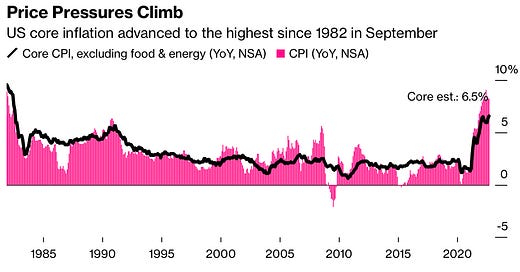Inflation is a Political Wrecking Ball
There’s no winning with voters on inflation and rising living costs. Incumbent governments—prepare to get whacked.

After a glimmer of electoral hope towards the end of summer, aided by some deft issue deflection and assistance from out-of-the mainstream challengers, Democrats are once again staring reality in the face with three weeks to go until the midterms. The latest economic reports show U.S. core inflation, excluding volatile food and energy prices, at a forty-year high with overall consumer prices up more than 8 percent on the year. Americans continue to watch their paychecks erode as they confront higher prices in nearly every aspect of life.
It will take an act of God or an incredibly inept Republican Party to fail to convert this economic pain among voters into control of one or both legislative chambers in the November elections.
As recent Global Progress/YouGov data from 11 leading democratic countries shows, inflation is a political wrecking ball for incumbent governments. Although citizens don’t have a consistent idea of what should be done about inflation—and many opposition parties have no clear alternative policy ideas on the matter—most voters don’t like the situation and are apt to punish sitting parties for rising costs regardless of their actions.
Respondents in the survey were given three options about inflation and asked which one best reflects their own view. Across all 11 countries, 62 percent of citizens say they lack confidence in their own government’s ability to get inflation under control. In contrast, one tenth of global citizens believe not much can be done on inflation and about another fifth say they have confidence in their government on inflation.
There is not much that any government—good or bad—can do to stop inflation, we just need to live with it and do the best we can to manage. (10 percent)
There are things that capable governments could do to combat inflation, but I don’t have much confidence in our current government to get it under control. (62 percent)
There are things that capable governments can do to combat inflation and I have confidence that our current government will be able to get it under control. (18 percent)
As seen in the chart below, more than half to nearly 70 percent of citizens in each of the 11 countries surveyed say they lack confidence in their own government’s ability to control inflation.
These numbers should give incumbent parties everywhere night sweats, especially if they have elections soon. It doesn’t particularly matter if the governments are run by technocrats or leftists or right-wingers—they will suffer. Ruling governments in Sweden and Italy have already fallen. New U.K. Prime Minister Liz Truss is in total free fall from her shambolic mini-budget proposal that sough to cut taxes on the wealthy while borrowing more for government spending. President Biden and Democrats are on track to lose the House of Representatives and maybe the Senate despite passing a huge bill called the “Inflation Reduction Act” that most Americans support but don’t believe will reduce inflation in the short-term.
The problem for sitting governments regardless of their ideological make-up is that voters don’t really like any traditional ideas for combating inflation, such as increasing interest rates or cutting spending, and don’t have patience for excuse-making by leaders. The most popular ideas in the survey for dealing with rising costs are things like cutting gas taxes, lowering or introducing energy price caps, increasing the minimum wage, and increasing welfare benefits. In contrast, only one-fifth of citizens globally want to see increased interest rates.
Likewise, in another question, large majorities of citizens across all 11 countries say they would oppose their own government taking action to reduce consumer prices if it means that “rent and mortgage payments increase”; “taxes paid by people like you increase”; or that “unemployment increases.” The only consequence that global citizens are willing to stomach to reduce inflation is “rich people pay more taxes”—an idea backed by two-thirds of people across the 11 countries and something Liz Truss’s team should have relayed before the unveiling of her trickle-down economic plans.
Voters in multiple national political contexts basically just want prices down now, along with subsidies or offsets for energy and other household costs in the meantime. Understandably, they don’t want any personal pain or larger economic sacrifices to deal with inflation.
Since it’s nearly impossible for any government to deliver this in a timely fashion, the result will likely be the same across many democratic countries: Vote ‘em out!






